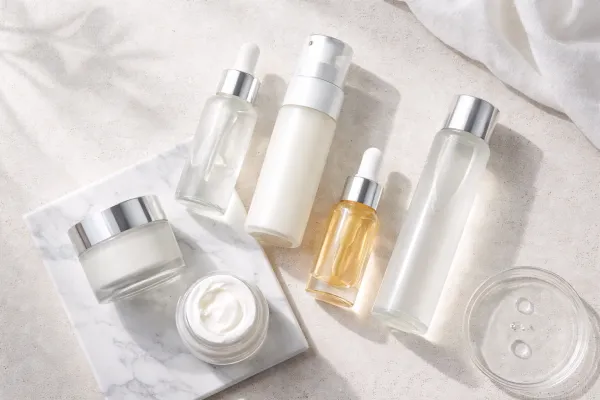Recognizing the Signs of a Damaged Skin Barrier
Is your skin dry, itchy, or breaking out? Learn to recognize the 7 signs of a damaged skin barrier and discover effective ways to repair and protect it.

Let's talk about your skin, specifically that invisible shield you've got called the skin barrier.
Ever feel like your skin's just not right, even if you can't put your finger on why? You might have a damaged skin barrier.
Knowing the signs of a damaged skin barrier is like having a superpower – you can catch problems early and fix them before they get out of hand.
Key Takeaways about Signs of a Damaged Skin Barrier
- A damaged skin barrier can lead to dryness, sensitivity, itchiness, acne, and a rough texture.
- Environmental factors, harsh skincare, sun exposure, and internal factors like stress can damage the skin barrier.
- Repairing a damaged skin barrier involves moisturizing, simplifying your skincare routine, and protecting your skin from environmental stressors.
- Look for moisturizers with ceramides, cholesterol, and fatty acids to help restore the skin's protective layer.
- Maintaining a healthy lifestyle with proper hydration, a balanced diet, and enough sleep supports overall skin health and barrier function.
Signs of a Damaged Skin Barrier
What is the Skin Barrier and Why Does it Matter?
Think of your skin barrier, specifically the stratum corneum, as the ultimate bodyguard for your body.
It keeps the good stuff in, like hydration, and the bad stuff out, like pollution, UV rays, and those nasty little pathogens that cause infections.
When this barrier gets messed up, it's like having a chink in your armor. Things start to go wrong.
Dryness and Flakiness: The First Red Flag
One of the most obvious signs of a damaged skin barrier is dryness and flakiness.
It's like your skin's screaming for a drink. This happens because the barrier can't hold onto moisture like it should.
I've seen countless clients come in with dry, scaly patches, thinking they just need a heavier moisturizer. Sometimes, the problem isn't the moisturizer itself, but a compromised barrier.
Sensitivity and Irritation: When Your Skin Gets Moody

Another telltale sign is sensitivity and irritation.
Suddenly, your go-to cleanser stings, or a gentle breeze feels like sandpaper. This happens because the barrier is weakened, allowing irritants to penetrate and cause inflammation.
If your skin is suddenly reacting to products it used to love, it might be time to investigate your barrier.
Itchiness: More Than Just a Nuisance
Itchiness is another common symptom. It's that annoying feeling that makes you want to scratch your skin off.
This often goes hand-in-hand with dryness, as a lack of moisture can disrupt the skin's pH balance and trigger itch receptors.
Acne and Breakouts: The Unwelcome Guests
Believe it or not, a damaged skin barrier can also lead to acne and breakouts.
When the barrier is compromised, it can't effectively regulate sebum production, leading to clogged pores and bacterial overgrowth. This can result in blackheads, whiteheads, pustules, and even cysts.
Rough Texture: Losing That Smooth Feeling
Your skin should feel smooth and supple, like a baby's bottom.
If it feels rough or bumpy, it could be a sign of a damaged barrier. This happens because dead skin cells aren't shedding properly, leading to a buildup on the surface.
Discoloration: Uneven Skin Tone
Discoloration, such as redness or dark patches, can also occur when the barrier is compromised.
This is often due to inflammation and changes in melanin production. If you notice uneven skin tone, it's worth considering the health of your skin barrier.
Infections: When Things Get Serious
A weakened barrier leaves your skin vulnerable to infections, whether bacterial, viral, or fungal.
This is because the barrier's protective function is compromised, allowing these invaders to breach the defenses.
What Causes a Damaged Skin Barrier?
So, what causes this barrier to break down in the first place? Several culprits could be at play.
Environmental Factors
Environmental stressors like extreme weather (think scorching sun, biting wind, and freezing temperatures) and pollution can wreak havoc on your skin barrier.
Harsh Skincare
Overdoing it with harsh skincare products, like strong cleansers and excessive exfoliation, can strip away the skin's natural oils and damage the barrier.
Sun Exposure
Too much sun without proper protection can lead to sun damage and weaken the barrier. Always wear sunscreen, even on cloudy days.
Internal Factors
Internal factors like stress, lack of sleep, and a poor diet can also contribute to a damaged barrier. Remember, your skin is a reflection of your overall health.
Genetic Predispositions
Sometimes, genetics play a role. Conditions like eczema and psoriasis can disrupt the skin barrier.
Top Tips to Repair Your Skin Barrier
1. Use Gentle Cleansers
Harsh cleansers can strip the skin of its natural oils, further damaging the barrier. Opt for mild, fragrance-free cleansers formulated for sensitive skin. Look for ingredients like glycerin and hyaluronic acid to cleanse while keeping your skin hydrated.
2. Moisturize Regularly
A damaged barrier needs replenishment. Use moisturizers containing ceramides, cholesterol, and fatty acids— these mimic your skin's natural lipids and help repair the barrier. Apply moisturizer immediately after cleansing to lock in hydration.
3. Avoid Over-Exfoliation
While exfoliation removes dead skin cells, overdoing it can weaken your skin barrier. Limit chemical exfoliants like AHAs and BHAs to once or twice a week, and avoid physical scrubs entirely if your skin feels sensitive or raw.
4. Protect from Environmental Stressors
Daily exposure to UV rays, pollution, and harsh weather can harm your skin barrier. Always apply a broad-spectrum sunscreen with SPF 30 or higher, and consider using antioxidant serums with vitamin C or E to combat free radicals.
5. Maintain a Healthy Lifestyle
Your skin's health reflects your overall well-being. Drink plenty of water to stay hydrated, eat a diet rich in omega-3 fatty acids and antioxidants, and aim for at least 7-8 hours of sleep each night to give your skin time to repair and regenerate.
Repairing a Damaged Skin Barrier: Getting Back on Track
Now, for the good news: you can fix a damaged skin barrier. It takes time and consistency, but it's definitely doable.
Moisturize Regularly
Moisturizing is key.
Look for moisturizers with ceramides, cholesterol, and fatty acids, as these ingredients help replenish the skin's natural lipids.
I recommend moisturizers for sensitive skin for those with a damaged barrier.
Simplify Your Skincare Routine
Less is more when it comes to repairing a damaged barrier. Cut back on harsh products and exfoliation.
Stick to gentle cleansers and products without irritants like dyes and fragrances. Check out our guide on skincare routine for sensitive skin for a simplified approach.
Protect from Environmental Stressors
Shield your skin from the elements.
Wear sunscreen every day, rain or shine, and consider protective clothing when needed.
Our article on best sunscreens for sensitive skin can help you find the right one.
Maintain a Healthy Lifestyle
A healthy lifestyle is crucial for healthy skin.
Stay hydrated, eat a balanced diet, manage stress, and get enough sleep. Check out the American Academy of Dermatology's website for more tips on maintaining healthy skin.
Conclusion: Your Skin Barrier is Worth Protecting
Your skin barrier is essential for healthy, radiant skin.
By understanding the signs of a damaged barrier and taking steps to repair and protect it, you can keep your skin looking and feeling its best.
Remember, consistency is key. Just like building a successful business, building a healthy skin barrier takes time and effort, but the payoff is worth it.
Frequently Asked Questions
How long does it take to repair a damaged skin barrier?
It can take anywhere from a few weeks to several months, depending on the severity of the damage. It depends on the severity of the damage and the individual, but with consistent use of barrier-repairing products and gentle skincare practices, you can typically see improvements within 2-6 weeks. Remember, skin barrier repair is a marathon, not a sprint. Be patient and persistent, and you'll reap the rewards. Results can vary depending on the severity of the barrier damage and the specific product used. Some people may notice improvements within days, while others may take several weeks.
Can I still wear makeup if I have a damaged skin barrier?
It's best to avoid makeup until your barrier is healed, as it can further irritate the skin. However, if you must wear makeup, choose non-comedogenic, fragrance-free products and ensure thorough but gentle cleansing afterward. Because many beauty products contain preservatives, chemicals or fragrances that could irritate or dry out your skin, it's a good idea to introduce new products one at a time. If you have sensitive skin, use mild, "fragrance free" products, as products containing fragrances can leave skin feeling irritated and dry. Fragrances and other potential allergens can irritate and further compromise a damaged skin barrier, especially in those with sensitive skin or conditions like eczema and rosacea.
What are ceramides, and why are they important?
Ceramides are lipids that help hold skin cells together and maintain the barrier's integrity. Ceramides are like the mortar between the bricks (skin cells) of your skin barrier. They're essential lipids that help maintain the barrier's structure and prevent moisture loss. When your skin lacks ceramides, it's like having a wall with missing mortar – weak and vulnerable. Moisturizers with ceramides help replenish these vital lipids, strengthening your skin's defenses. They are crucial for people with sensitive skin or conditions like eczema and psoriasis. Ceramides make up about 50% of the lipid matrix and are crucial for maintaining the barrier's structural integrity.
Is it okay to exfoliate if I have a damaged skin barrier?
Avoid exfoliating until your barrier is repaired, as it can worsen the damage. Harsh exfoliating, whether with physical scrubs or chemical exfoliants, can strip away the skin barrier, leading to dryness, irritation, and increased sensitivity. It's like taking a sandblaster to your skin's protective wall. Exfoliate gently and in moderation, no more than 1-2 times per week. Avoid over-exfoliating to prevent further skin damage. Stick to a simple, gentle routine until your barrier heals. Because many beauty products contain preservatives, chemicals or fragrances that could irritate or dry out your skin, it's a good idea to introduce new products one at a time.
How can I tell if my skin barrier is healing?
You'll notice a decrease in dryness, sensitivity, itchiness, and other symptoms. Is your skin throwing a tantrum? Redness, dryness, flaking, itching, stinging, and increased sensitivity to products you used to tolerate are all signs of a compromised skin barrier. As your skin barrier heals, these symptoms will gradually diminish. Your skin might feel less tight, rough, or develop fewer tiny cracks. Breakouts may also decrease as the barrier strengthens and better protects against bacteria. Think of it as your skin waving a white flag, signaling it needs help - and as it recovers, it will stop sending those distress signals.
Check out these external resources for more information






